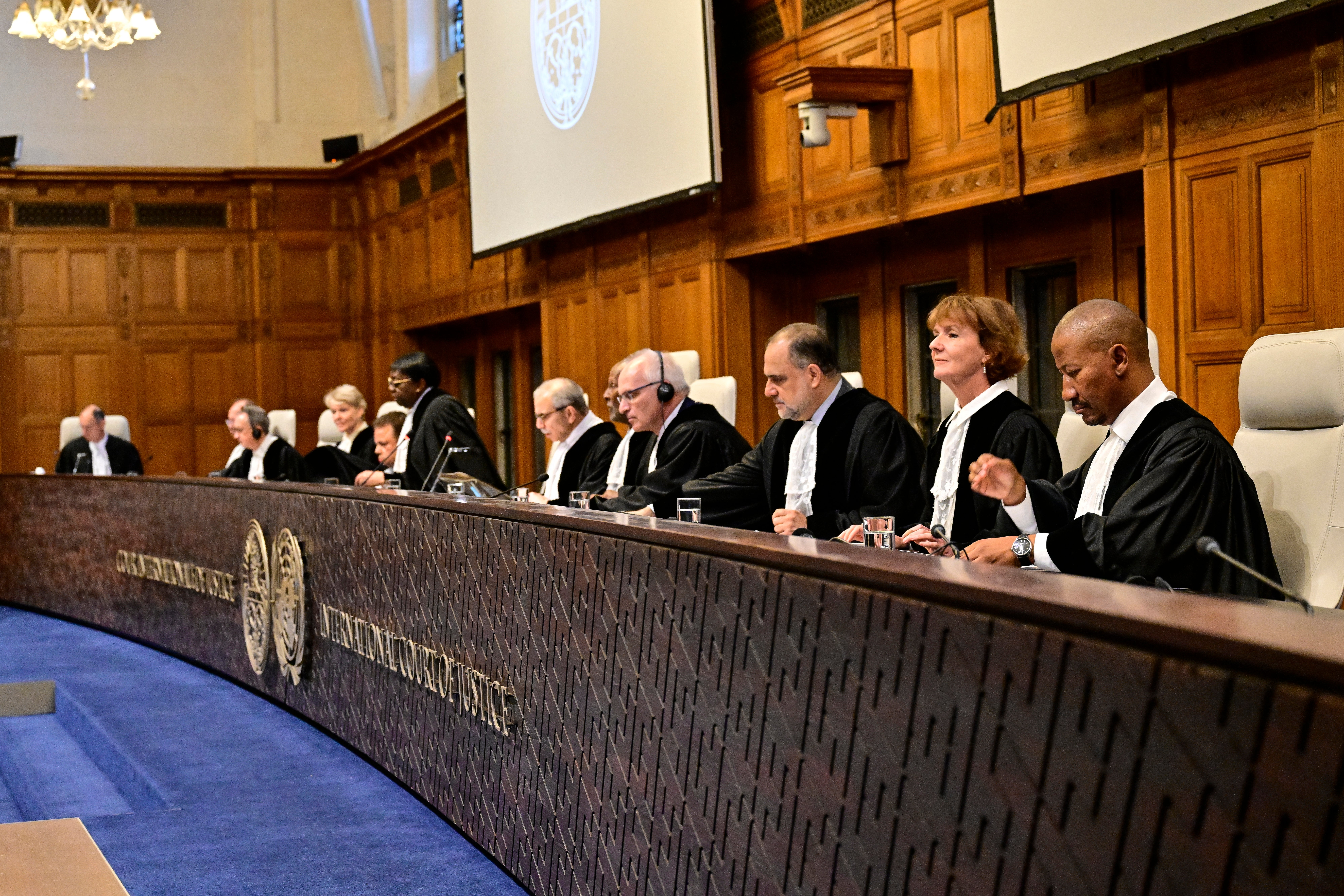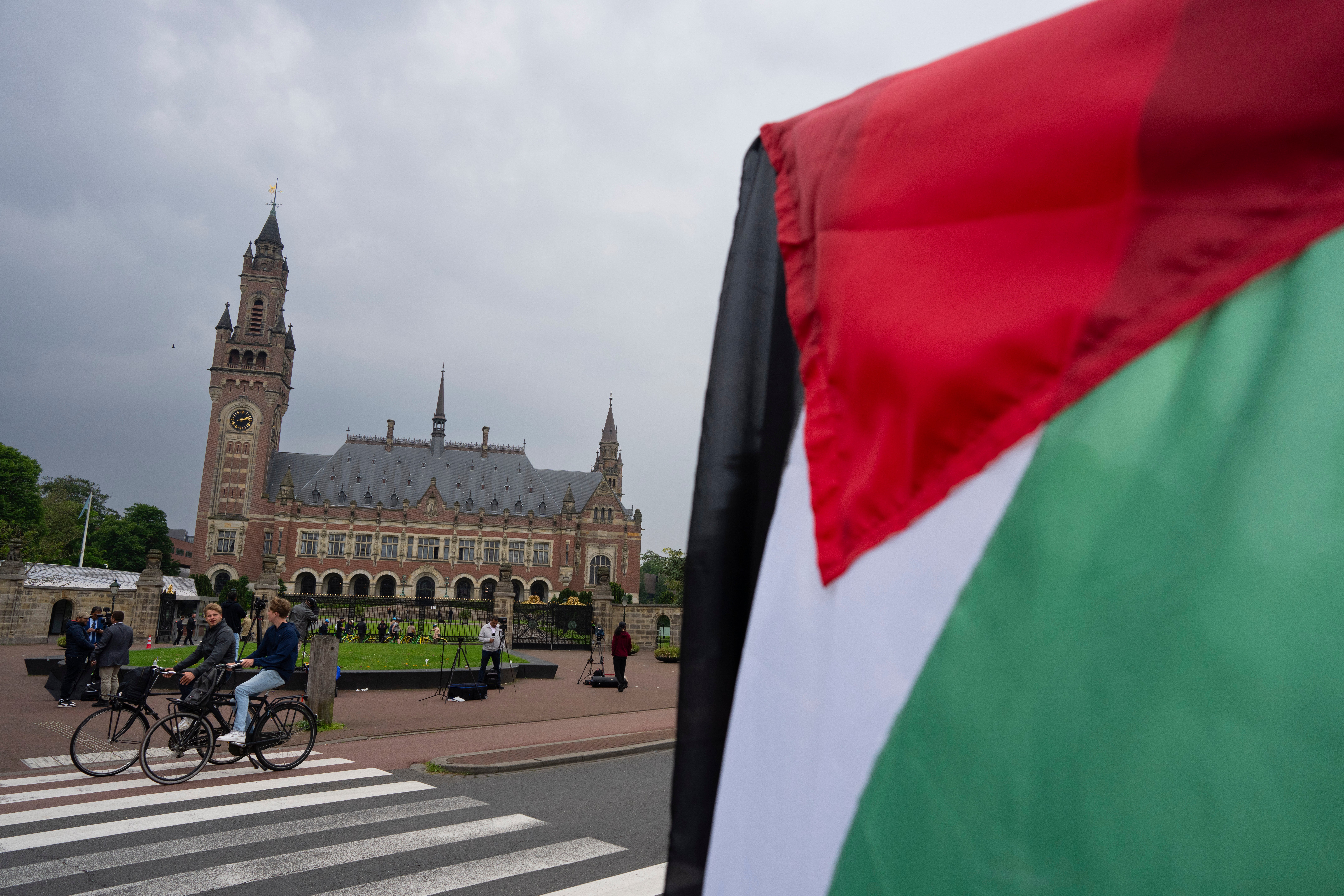UN’s top court orders Israel to halt military offensive in Gaza’s Rafah
Israel says it has a right to defend itself against Hamas and vehemently denies allegations from South Africa – who have brought the case – of genocide inside Gaza
The UN’s top court has ruled that Israel must “immediately halt its military offensive” in the city of Rafah on Gaza’s southern border.
The order by the International Court of Justice (ICJ) further ratchets up international pressure on an increasingly isolated Israel to rein in its war on Hamas in Gaza. The decision marked the third time this year the 15-judge panel has issued preliminary orders seeking to reduce the death toll and alleviate humanitarian suffering in the territory as part of a case filed late last year by South Africa accusing Israel of committing genocide, allegations vehemently denied by Israel.
“The court considers that, in conformity with the obligations, under the genocide convention, Israel must immediately halt its military offensive in Rafah and any other action in the Rafah governorate which may inflict on the Palestinian group in Gaza conditions of life that could bring about its physical destruction in whole or in part,” the court’s president, Nawaf Salam said. The decison was made by 13 votes to two.
Judge Salam said Israel must also allow "unimpeded access" for any fact-finding or investigative mission sent by the United Nations to investigate the genocide allegations. The court said Israel must also reopen the Rafah crossing from Gaza into Egypt – with the Israeli military having taken control of the Gaza side earlier this month – to allow humanitarian aid to flow into the enclave. The court did not call for a full ceasefire throughout Gaza as South Africa had requested at hearings last week. It has already found that Israel's military operations pose a "real and imminent risk" to the Palestinian people in Gaza.
Israel insists it has the right to defend itself from Hamas and is unlikely to comply with the ruling. Israel launched its air and ground war on Gaza after Hamas stormed into southern Israeli communities in a terror attack on 7 October, killing around 1,200 people and seizing more than 250 hostages. More than 35,000 Palestinians have since been killed in the Israeli offensive, health officials in the Hamas-run strip say.
Benny Gantz, a member of Israel’s war cabinet, said after the ruling: "The state of Israel set out on a just and necessary campaign following the brutal massacre of its citizens, abhorrent sexual violence perpetrated against its women, kidnapping of its children and rockets fired at its cities. The state of Israel is committed to continue fighting to return its hostages and promise the security of its citizens – wherever and whenever necessary – including in Rafah.
"We will continue operating in accordance with international law wherever we might operate, while safeguarding to the best extent possible the civilian population. Not because of the ICJ, but because of who we are and the values we stand for."

Israeli prime minister Benjamin Netanyahu is under heavy pressure at home to end the war. Thousands of Israelis have joined weekly demonstrations calling on the government to reach a deal to bring the hostages home, fearing that time is running out. Around 120 people are still being held in Gaza, although a number are believed to be dead. Ahead of this ICJ announcement, the Israeli army said the bodies of three more hostages killed on 7 October have been recovered overnight from Gaza.
Military officials said the bodies of Hanan Yablonka, Michel Nisenbaum, and Orion Hernandez have been identified and their families have been informed. The army said they were killed on the day of the attack at the Mefalsim intersection and their bodies were taken to Gaza.
Israeli opposition leader Yair Lapid said the court's failure to link a demand for an end to fighting with a demand to return Israeli hostages in Gaza was "a moral collapse and a moral disaster". Former Israeli UN envoy Danny Danon said: "As ICJ judges in The Hague deliberate in comfort and return to their families, 125 hostages languish in tunnels. Israel will not cease the war until our hostages are brought back home and Hamas is completely defeated."
Judge Salam did call for the hostages to be freed while delivering the Rafah judgement. “The court finds it deeply troubling that many of these hostages remain in captivity and reiterates its call for their immediate and unconditional release,” he said.
The ICJ has not ruled on the substance of the genocide accusation from South Africa – that could take years – but the court has rejected Israel's demand to throw the case out. South Africa requested interim orders to protect Palestinians while the legal case continues. South Africa’s lawyers last week asked to impose emergency measures, saying Israel’s attacks on Rafah must be stopped to ensure the survival of the Palestinian people.
In previous rulings, the ICJ ordered Israel to prevent acts of genocide against the Palestinians and allow aid to flow into Gaza, while stopping short of ordering a halt to Israeli military operations.

The judge opened Friday’s hearing by describing the humanitarian situation in Rafah – where around one million Palestinians are sheltering – as “disastrous”. He added that the Israeli evacuation orders handed down to those in the area was not “sufficient to alleviate the immense risk to which the Palestinian population is exposed as a result of the military operation in Rafah”.
Israel launched its assault on Rafah this month, forcing hundreds of thousands of Palestinians to flee a city that had become a refuge to around half of the population's 2.3 million people. Rafah has also been the main route in for aid, and international organisations say the Israeli operation has cut off the enclave and raised the risk of famine.
While the ruling by the ICJ is a blow to Israel's international standing, the court does not have a police force to enforce its orders. In another case on its docket, Russia has so far ignored a 2022 order by the court to halt its invasion of Ukraine.
Israel has signalled it will brush off the ICJ order to stop its operations. "No power on earth will stop Israel from protecting its citizens and going after Hamas in Gaza," Avi Hyman, the government spokesperson, said in a press briefing on Thursday.
While Israel is unlikely to comply with the ICJ order, it heaps more pressure on the increasingly isolated country. Criticism of Israel’s conduct in the war in Gaza has been growing, even from its closest ally, the United States, which has warned against a full invasion of Rafah, where hundreds of thousands of Palestinians have sought shelter from fighting elsewhere.
The panel of 14 permanent judges from countries around the world, plus an extra ad hoc judge appointed by Israel as a party to the case, took their places inside the courtroom in The Hague before the hearing. Outside, a small group of pro-Palestinian demonstrators waved flags.
On Monday, the chief prosecutor of the International Criminal Court (ICC) – a separate court also based in The Hague – announced that he had filed an application for arrest warrants for Mr Netanyahu, Israel’s defense minister, Yoav Gallant, and three top Hamas leaders – Yahya Sinwar, Mohammed Deif and Ismail Haniyeh – for alleged war crimes and crimes against humanity in the Gaza Strip and Israel.
Israel is not an ICC member, so even if the arrest warrants are issued, Mr Netanyahu and Mr Gallant do not face any immediate risk of prosecution. But the threat of arrest could make it difficult for the Israeli leaders to travel abroad.
Reuters contributed to this report
Join our commenting forum
Join thought-provoking conversations, follow other Independent readers and see their replies
Comments
Bookmark popover
Removed from bookmarks